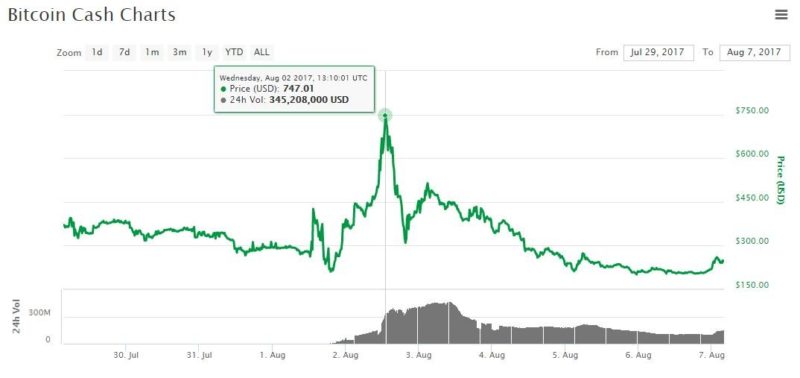Latest news about Bitcoin and all cryptocurrencies. Your daily crypto news habit.
Cryptocurrency exchange Bitstamp will support three Bitcoin Cash trading pairs – BCH/USD, BCH/EUR, and BCH/BTC – starting the first week of December due to customer demand.
Bitstamp, the twelfth largest crypto exchange by volume and the seventh highest ranked exchange on BestBitcoinExchange.io, recently announced it would support Bitcoin Cash (BCH) trading starting the first week of December.
Bitcoin Cash is currently trading around $1600. Although originally supported by only a handful of exchanges following its creation on August 1st, BCH’s recent price surges have spurred demand for it on other platforms. It currently holds the third highest market cap at $26 billion, behind Bitcoin and Ethereum.
An announcement on the Bitstamp website states:
In response to the demand we have been seeing for Bitcoin Cash trading (BCH) and as part of our efforts to list more currencies, we have decided to provide trading support for the following three pairs: BCH/USD, BCH/EUR, and BCH/BTC.
Bitcoin Cash will be the fifth tradeable cryptocurrency available on Bitstamp. Three of its four other available currencies – Bitcoin, Ethereum, and Ripple – all claim the top four highest market caps, with Bitcoin Cash filling in third. It’s fifth cryptocurrency, Litecoin, sits at seventh.
The Winding Path Towards Acceptance
The announcement marks a significant milestone for Bitcoin Cash, which contentiously divided the crypto community well before its creation on August 1. It was created following deep disagreements over how to expand Bitcoin network capacity and resolve burgeoning congestion issues.
Proponents of Bitcoin Cash favored increasing Bitcoin’s block sizes, an “on-chain solution”, rather than adopting another proposal named Segregated Witness (SegWit), an “off-chain solution”. Debates over the proper solution effectively split the community into two camps. When SegWit was ultimately locked in by voter consensus, supporters of big blocks decided to fork Bitcoin and create Bitcoin Cash instead.
Despite the split now months behind us, BCH continues to face controversy over a myriad of issues, most prominently its use of the “Bitcoin” name. Opponents claim that its use of the Bitcoin brand confuses new investors and that the coin promotes itself as “the real Bitcoin” while sabotaging the credibility of the original Bitcoin project.
Uncertainty over the new coin prompted several exchanges to keep it unlisted following its creation. Coinbase, one of the world’s largest and most popular Bitcoin exchanges, initially refused to credit their customers with BCH during the split. They later reversed this stance following consumer backlash and a mass exodus of customers moving their BTC to other exchanges where their BCH would be honored. However, BCH withdrawals will still not be available there until January 1, 2018.
Other exchanges and wallets which initially did not support Bitcoin Cash include Poloniex (later added mid-August) and the BitPay wallet (added September).
Bitcoin Cash prices initially spiked above $700 within its first day of trading, though prices quickly fell off soon after as investors moved to sell off their coins for free profits. Within a week, BCH had settled down to a stable price of $200, although it continued to be traded and held by a small community of supporters.
Rising From The Ashes
In spite of these early setbacks, Bitcoin Cash persisted, and it’s infrastructure support has grown significantly since its early days. It is now supported by over 35 exchanges and is 9677 blocks ahead of the original chain. It is also currently 4.4% more profitable to mine on the Bitcoin Cash blockchain.
Demand for BCH has also jumped sporadically in response to market events. The value unexpectedly tripled in late August when BCH mining became more profitable following a 50% drop in mining difficulty. An increased demand from South Korea also drove up prices.
More recently, on November 8, the SegWit2x proposal (which would have implemented 2Mb block sizes in Bitcoin on top of SegWit) was cancelled. This spurred numerous investors to move to from BTC to BCH, which has already implemented increased block sizes. The subsequent rush into BCH drove prices to an all-time high of $2400. Although it crashed soon after, it has still maintained price levels well over $1000, a marked increase from its previous levels under $500.
Some exchanges still refuse to trade in Bitcoin Cash. BitMEX, the largest Bitcoin exchange by volume, actually announced it would be selling all of its customers’ BCH in exchange for BTC. Interestingly, it was increased demand for BCH which finally prompted the exchange to acknowledge it. BitMEX previously took a harsh stance against the coin, releasing a statement claiming that “BitMEX considers any and all contentious hardfork tokens as altcoins.”
This unusual move by BitMEX only underscores the suspicion many continue to have over Bitcoin Cash and its community. Nonetheless, BCH’s recent price gains and continued support seems to solidify BCH’s position as a serious cryptocurrency.
How do you feel about Bitcoin Cash’s recent gains? Did you sell of your coins at the first chance, or did you hold onto them? Let us know in the comments below!
Images courtesy of Bitstamp, CoinMarketCap, Shutterstock
The post Bitstamp to Add Bitcoin Cash Trading in December appeared first on Bitcoinist.com.
Disclaimer
The views and opinions expressed in this article are solely those of the authors and do not reflect the views of Bitcoin Insider. Every investment and trading move involves risk - this is especially true for cryptocurrencies given their volatility. We strongly advise our readers to conduct their own research when making a decision.

